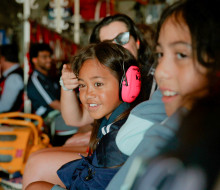
Camp Quality children enjoy ‘view from the top’
17 January 2025
Unfortunately you are viewing this website on an outdated browser which does not support the necessary features for us to provide an adequate experience. Please switch to a modern browser such as latest version of Google Chrome, Mozilla Firefox, Apple Safari or Microsoft Edge.
Ngā mihi nui
COVID-19
On 19 March 2020, New Zealand closed its borders. On 9 April, the Prime Minister announced that a network of Managed Isolation and Quarantine Facilities (MIQFs) would be established, to bring citizens and residents home.
The Royal New Zealand Air Force, along with Army and Navy, was tasked with supporting the MIQFs, as part of a multi-agency effort run by the Ministry of Business, Innovation and Employment.
But even before the creation of the MIQFs, around 120 Defence Force planning and logistics staff were being attached to the Government’s COVID-19 response teams.
New Zealand developed the concept of hotels being used as isolation centres where returnees were isolated for two weeks. By October 2020 around 1,200 NZDF personnel were rotating through the MIQFs, taking their turn. Personnel would typically work seven days on, six days off.
Operation Protect, the name of the NZDF contribution, touched at the heart of what the Air Force trains to do. The staff were on the front line, helping to protect our country and the well-being of our population, and we did it in a professional and caring way that was noticed and had a powerful effect on the thousands of people returning to New Zealand.
When more than 1,000 Ni-Vanuatu seasonal workers were stranded in New Zealand, we answered a call from the Government of Vanuatu and our Royal New Zealand Air Force flew them home. Other flights to the Pacific transported both people and critical supplies such as Personal Protective Equipment (PPE).
As of July 2021, over 150,000 returnees had been through an MIQF.
“When we took a bus ride to a managed exercise area, they kept their distance, but one of the soldiers provided some entertainment for my daughter for half an hour, telling her riddles. Another time, someone did a lot of chalk mind-teasers on the carpark tarmac below our window. It’s that kindness and thoughtfulness that makes people’s stay that little bit better.”
- Mike LaFranchie, Taranaki (returning from the United States)
A big part of our work in the Air Force involves assisting communities affected by conflict or natural disasters. The fact that we work to protect and help people is one very good reason why we're so passionate about what we do. It gives our lives real meaning and purpose.
Find out moreOur other areas of work